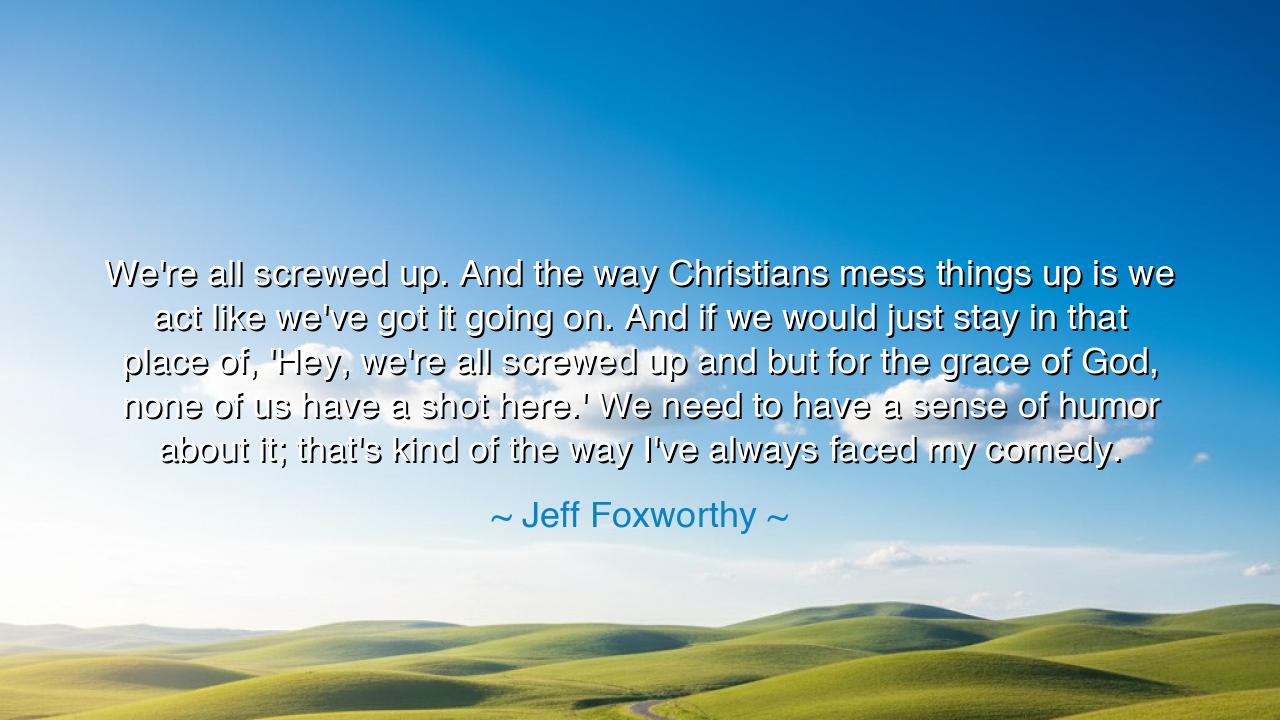
We're all screwed up. And the way Christians mess things up is we
We're all screwed up. And the way Christians mess things up is we act like we've got it going on. And if we would just stay in that place of, 'Hey, we're all screwed up and but for the grace of God, none of us have a shot here.' We need to have a sense of humor about it; that's kind of the way I've always faced my comedy.






There is deep truth in the words of Jeff Foxworthy, who, beneath the laughter of his comedy, speaks with the clarity of a philosopher cloaked in humor. When he says, “We’re all screwed up,” he calls forth one of the oldest truths of humankind: that perfection is a myth, and the attempt to appear perfect is the root of hypocrisy. The wise of old knew this — that man is dust and breath, fragile yet proud. Foxworthy’s humor, born from humility, reminds us that only when we accept our flaws can grace enter. For how can the cup be filled if it is never emptied of pride?
In the ancient temples, priests would wash their hands before prayer, not because their hands were dirty, but to acknowledge that imperfection lives in all things touched by man. So too must the soul wash itself with honesty before it speaks of righteousness. Foxworthy’s rebuke is not one of scorn but of awakening — he warns against the trap of those who “act like we’ve got it going on,” who wear masks of virtue while denying the brokenness that makes them human. For in pretending to be whole, we become hollow; in admitting we are cracked, we allow light to pass through.
Throughout the ages, the greatest teachers have spoken the same truth. Saint Augustine, before becoming one of Christianity’s mightiest voices, confessed to a life of sin and restlessness. His transformation did not come from pretending to be righteous but from recognizing that “our hearts are restless until they rest in God.” That is the spirit of Foxworthy’s words — humility before grace. He reminds us that all goodness begins with the admission of weakness, that “but for the grace of God, none of us have a shot.” This is not despair; it is liberation. For when man knows he cannot save himself by pride, he becomes open to mercy.
And then comes the second blade of his wisdom — humor. “We need to have a sense of humor about it; that’s the way I’ve always faced my comedy.” In this, he teaches that laughter is not denial but understanding. Humor is the balm of the weary soul, the way in which truth can be faced without bitterness. The ancients, too, laughed amidst ruin — for they knew that laughter is not the enemy of faith, but its companion. When we laugh at ourselves, we loosen the chains of ego. When we see the absurdity of our own failings, we rise above them. Laughter, in its purest form, is a hymn to grace.
Consider the story of Abraham Lincoln, who carried the sorrow of a divided nation on his shoulders. When mocked, when burdened, when faced with tragedy, he often answered with a smile and a story. His humor was not callous — it was sacred. It was his way of acknowledging the brokenness of the world while refusing to be broken by it. He, like Foxworthy, understood that humor is not weakness but wisdom: it allows the spirit to breathe amidst the fires of struggle.
Thus, Jeff Foxworthy stands in a long line of humble jesters and wise fools — those who speak truth through laughter. His message is that faith without humility becomes arrogance, and conviction without humor becomes cruelty. To be human is to be flawed, to fall, to rise again through grace. But to laugh while doing so — that is the mark of one who truly understands the mystery of life. Humor, then, becomes not mockery, but reverence; not escape, but endurance.
Let this teaching be a mirror to all who hear it: Do not wear masks of holiness. Instead, embrace your imperfection, and let laughter remind you of your smallness in the grand design. Admit your brokenness, and you will find strength. Laugh at your failings, and you will find peace. For only those who can smile at their own folly have truly understood the mercy of the divine. And remember this: humility without humor is sorrow, but humor without humility is mockery. Together, they become wisdom — the laughter of a soul that has found grace.






AAdministratorAdministrator
Welcome, honored guests. Please leave a comment, we will respond soon